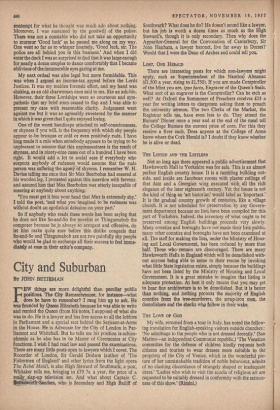City and Suburban
BY JOHN BETJEMAN FEW things are more delightful than peculiar public positions, The City Remembrancer, for instance—what does he have to remember? I rang him up to ask. He was founded by Queen Elizabeth because he was able to write and remind the Queen (from his notes, I suppose) of what she was to do. He is a lawyer and has free access to all the lobbies in Parliament and a special seat behind the Serjeant-at-Arms in the House. He is Advocate for the City of London in Par- liament and Whitehall. But he tells me his position is schizo- phrenic as he also has to be Master of Ceremonies at City functions. I wish I had read law and passed the examinations. There are many little posts open to lawyers which I covet. The Recorder of London, Sir Gerald Dodson (author of 'The Fishermen of England' and other lyrics from the light opera The Rebel Maid), is also High Steward of Southwark, a post, Whitaker tells me, bringing in £.79 7s. a year, the price of a really slap-up television set. And what about Captain C. Bettesworth-Sanders, who is Secondary and High Bailiff of Southwark? What does he do? He doesn't sound like a lawyer, but his job is worth a dozen times as much as the High Steward's, though it is only secondary. Then why does the Apparitor-General for the Convocation of Canterbury, Sir John Hanham, a lawyer baronet, live far away in Dorset? Would that I were the Dean of Arches and could tell you.
LOST, ONE HERALD
There are interesting posts for which non-lawyers might atiply, such as Superintendent of the Nautical Almanac (f-1,500 a year, rising to f1,750). If you are made Comptroller of the Mint you are, ipso facto, Engraver of the Queen's Seals. What sort of an engraver is the Comptroller? Can he etch as well? At Oxford the Summoner of Preachers receives f15 a year for writing letters to clergymen asking them to preach the university sermon. The two Clerks of the Market, the Registrar tells me, have even less to do. They attend the Bursars' Dinner once a year and at the end of the meal tell the College Bursars the current price of corn. For this they receive a fiver each. Does anyone at the College of Arms know where the Cork Herald is? I doubt if they know whether he is alive or dead.
THE LISTED AND THE LISTLESS
Not so long ago there appeared a public advertisement that Hawksworth Hall in Yorkshire was for sale. This is an almost perfect English country house. It is a rambling building out- side, and inside are Jacobean rooms with plaster ceilings of that date and a Georgian wing executed with all the rich elegance of the later eighteenth century. Yet the' house is not the kind of thing an 'art historian' would label as 'important.' It is the gradual country growth of centuries, like a village church. It is not scheduled for preservation by any Govern- ment department because no lists have been compiled for this part of Yorkshire. Indeed, the inventory of what ought to be preserved among English buildings proceeds very slowly. Many counties and boroughs have not made their lists public, many other counties and boroughs have not been examined at all. The staff for making the lists, under the Ministry of Hous- ing and Local Government, has been reduced by more than half. Those who remain are discouraged. There are many Hawksworth Halls in England which will be demolished with- out anyone being able to come to their rescue by invoking what little State legislation exists, simply because the buildings have not been listed by the Ministry of Housing and Local Government. It is a great mistake to imagine that listing is adequate protection. At best it only means that you may get to hear fine architecture is to be demolished. But it is better than nothing, and nothing protects the majority of English counties from the tree-murderers, the scrap-iron men, the demolishers and the sharks whp follow in their wake.
THE LOVE OF GOD
My wife, returned from a tour in Italy, has noted the follow- ing translation for English-speaking visitors outside churches: 'No admittage to the people who is not dressed decently.' (San Marino—an independent-Communist republic.) 'The Venetian committee for the defence of children kindly requests both citizens and tourists to wear dresses more suitable to the propriety of the City of Venice, which in the wonderful pic- ture of her unmistakable tradition of noble behaviour, admits of no clashing discordance of strangely shaped or inadequate dress.' Ladies who wish to visit the scuola of religious art are requested to be suitably dressed in conformity with the serious- ness of this show.' (Rimini.)










































































 Previous page
Previous page